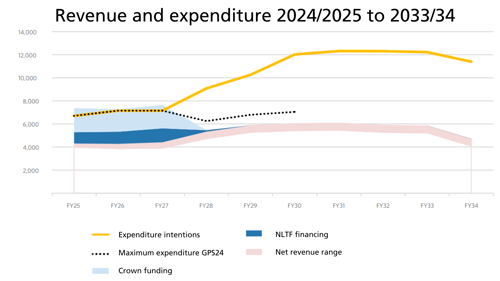Statement on road pricing
The need for reform and the expanded use of road pricing has recently been signalled by both the Government and Infrastructure New Zealand. This is an important moment in the history of infrastructure development in New Zealand. It could deliver significant benefits.
Road pricing includes a suite of tools that ensure road users pay the full costs of their time behind the wheel. This includes tolls for new roads, the expansion of road user charges (RUCs) to all vehicles and congestion charging in cities. Together these tools can ensure that all of us as road users face the costs we impose in choosing to use roads.
The original vision of the National Land Transport Fund was that road users – through petrol excise, RUCs and registration and licensing – would pay for the creation and maintenance of roading infrastructure. Ratepayers also make a contribution to spending on local roads.
Over the last decade the fund has not generated enough money to cover spending and has had to be increasingly topped up by Crown grants and loans. This is due in part to more efficient cars using less petrol, but also due to promises of new infrastructure by governments of all shades. The country already faces a deteriorating fiscal outlook (see the Treasury’s recent warning). In these circumstances, there is little room for infrastructure that cannot pay its way.
In addition to sound fiscal and economic reasons for road pricing, there are good environmental arguments too. Better road pricing can not only generate revenue but, by making road users pay the full costs of their time behind the wheel, it can incentivise people to make the most efficient decisions – economically and environmentally – in deciding whether, when and how to travel.
Tolls
A greater focus on tolling new roads can help inform when building a new road makes sense. We know that the people using a road get the vast majority of the benefits available (over 90%) when a new road is built. Therefore, a toll to use a new road should ideally cover the majority of the cost of that road. According to the Infrastructure Commission:
“If toll revenues are expected to be enough to cover the cost of a new road, this signals that it may be a good investment decision – people value it enough to support its build. If revenues are not enough to cover build, this is a signal that increased investment should be weighed up against other things... Currently tolls tend to recover less than 25% of the cost to build new roads, and sometimes much less.”
Road user charges
RUCs are based on distance travelled and weight, which are the two major causes of wear and tear on roads. Therefore, provided they are calculated accurately, RUCs are an ideal way to pay for the upkeep of the existing network. As petrol excise continues to dwindle it makes sense to move all vehicles across to RUCs. With satellite tracking, we could even ensure that people contribute to fixing the roads they use, removing the need for ratepayer contributions which are a very crude approximation of locally imposed costs.
Congestion charges
Finally, congestion charges help us make better use of existing roads. Most of our cities experience congestion in some form. Building new roads to fight congestion is expensive and often doesn’t solve the problem. The Infrastructure Commission points out:
“Over the last three decades, average urban travel speeds have slowed due to increasing traffic congestion, despite significant motorway expansion. Transport modelling suggests that this trend will continue, even with building further new roads, as new road capacity tends to cause people to drive more.”
Congestion charges encourage people to change their travel behaviour. This can include shifting the time of travel, finding alternative ways to commute such as public and active transport, or reducing travel overall (for example by removing unnecessary trips or altering choices over where to work and live). All of these changes can result in less pollution. Infrastructure Commission work shows that in addition to raising money, congestion charging in Auckland could reduce time spent in congestion by a third while also reducing spending on new roads by a fifth.
Of course, for people to be able to choose alternative transport options there have to be alternatives available in the first place. Until we can afford to invest in alternatives there won’t be any. This impasse has held back investing in public transport in our cities for decades. Congestion charging offers a critical circuit breaker for this problem because it raises revenue to invest in alternatives.
Road pricing is about paying for the full cost of our mobility choices. Taken together, the suite of road pricing tools will ensure that we can afford the infrastructure needed to move people and freight around efficiently. They can also incentivise people to think about the most appropriate ways to travel. Ideally, it should even help people question whether they need to make some of their trips at all.
Naturally there are concerns about the distributional impacts from heading down this road. However, work by the Infrastructure Commission suggests that when it comes to infrastructure, user pays ends up being better than just about any other ways of financing infrastructure in the long term.
This short summary of the potential benefits of road pricing cannot do justice to such a complex issue. The Infrastructure Commission and the Government have displayed considerable courage in placing road pricing squarely on the agenda. I would urge all parliamentarians and all parties to take a long view and find a way to place road pricing at the heart of future roading infrastructure funding.
There are clear economic and environmental benefits from going down this road. Current arrangements are no longer fit for purpose and will fall further and further behind the technology frontier that countries as different as France and Singapore embraced decades ago.
There will inevitably be grounds for disagreement. There will also be distributional concerns that will need to be addressed. My only plea is that we take the long view. The gains are indisputable. The costs are manageable. Avoiding the issue will only push even greater costs onto future road users and taxpayers.
As always, I stand ready to assist Parliament as it turns its mind to this important issue.



